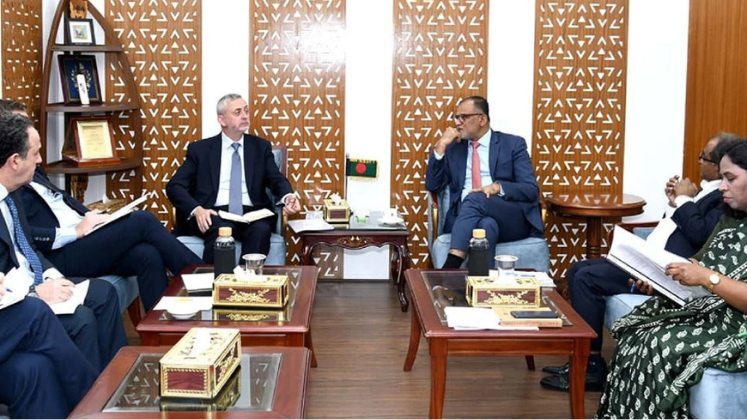
Commerce Adviser Sk Bashir Uddin stated about Bangladesh wanting to sign an Economic Partnership Agreement (EPA) with the European Union (EU), though this would be done after conducting a feasibility study and reviewing of bilateral trade data.
The remark came after the Adviser met with Michael Miller, the Ambassador and Leader of the EU delegation in Bangladesh, at the Dhaka Commerce Ministry.
Given that the EU is still Bangladesh’s biggest economic partner, Michael stated that the country might gain a lot from establishing an EPA with the EU. He added that because Bangladesh sells more commodities than it imports, there is a sizeable imbalance in bilateral commerce between the two countries. He stated that by boosting trade and investment, Bangladesh and the EU have the chance to develop together.
In order to sign preferential trade agreements like EPAs, Comprehensive Economic Partnership Agreements (CEPAs) and Free Trade Agreements (FTAs), Bangladesh has been negotiating with its main trading partners. When Bangladesh moves from the least developed nation (LDC) category to a developing one in November of next year, the agreements are intended to secure zero-duty trade benefits.
With yearly exports of goods valued at over US $ 25 billion, or more than 60% of Bangladesh’s total merchandise exports, the EU is the country’s biggest trading partner. In order to benefit from zero-duty trade following LDC graduation, Bangladesh has also been negotiating with the EU to get GSP Plus status. This is due to the fact that Bangladesh’s existing GSP status under the LDC category will expire in 2029.
After a nation graduates, the EU extends duty-free trade benefits for an extra three years, providing a grace period to guarantee a seamless transition. However, Bangladesh must sign 32 international conventions, including four fundamental ones pertaining to labour rights, environmental protection, human rights and good governance, in order to be eligible for GSP Plus status.
Therefore, Bangladesh would rather sign a trade agreement in order to receive sustainable economic benefits and long-term GSP Plus status. But Bangladesh has a dismal track record of concluding trade agreements. Only one preferential trade deal has been signed by the nation thus far and that was with Bhutan in December 2020.
“We want to sign the EPA with the EU and we are ready to start negotiations if the EU responds to our call for the EPA,” Commerce Secretary Mahbubur Rahman said. The Secretary stated that the EU Ambassador also brought up a few non-tariff problems at yesterday’s discussion, such as those pertaining to Chattogram port and the sourcing of pharmaceutical products from Bangladesh.
Bangladesh currently has duty-free access to the EU. Zero-duty facilities have previously been extended for three years, till 2029, by the EU.
Without an agreement, exporters will then be subject to duties of roughly 12%. Major export rivals of the nation, including Vietnam and India, have already negotiated free trade agreements with the union. The primary export to the EU is clothing. At the moment, the EU accounts for about 64% of Bangladesh’s yearly clothing exports.
Following LDC graduation, the apparel industry will face significant obstacles if the nation is unable to get either GSP Plus status or an EPA.






